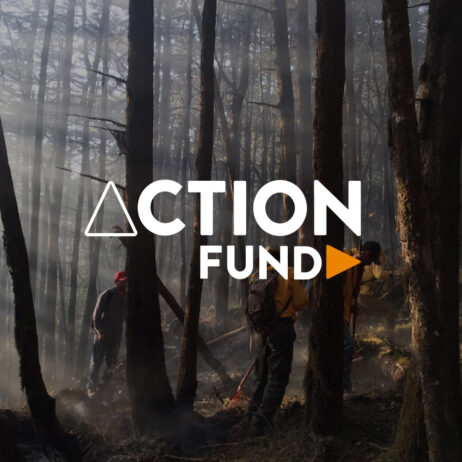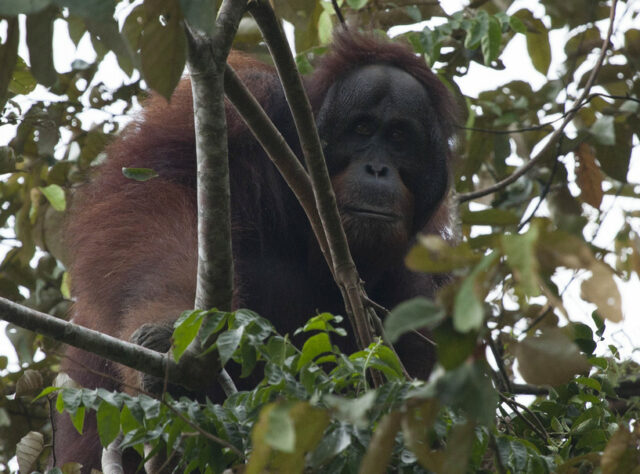
A male Bornean Orangutan (Pongo pygmaeus) in the Lower Kinabatangan floodplain, Malaysian Borneo. Image credit: Astrid Munoz.
“Because of the physiological, anatomical and genetic similarities between humans and non-human apes, great apes, which include Orangutan, are highly susceptible to human disease”,
writes Dr Isabelle Lackman, co-Director of World Land Trust’s (WLT) partner, Hutan, in Malaysian Borneo.
Together with habitat loss and poaching, disease is one of the greatest threats facing great apes globally and as protectors of Bornean Orangutans (Pongo pygmaeus) in the Kinabatangan flood plain, Hutan has been working with the IUCN SSC Primate Specialist Group to develop advisory guidelines for those who work in great ape habitat.
As background, the report quotes three Ebola viruses which resulted in the deaths of an estimated one-third of the world’s wild gorillas and chimpanzees. Other diseases, including polio-like viruses, monkey pox, anthrax, tuberculosis and respiratory illnesses carried from humans to great apes have also killed great apes and resulted in population decline. During the current COVID-19 pandemic, those responsible for the protection of orangutans and other great apes are being urged to be extra vigilant to ensure our virus isn’t passed on to them.
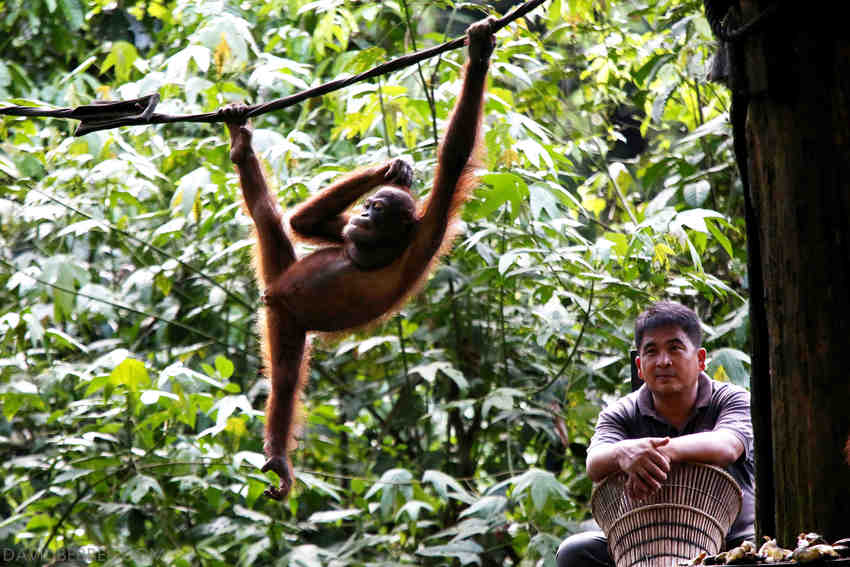
A young Bornean Orangutan in a care centre receives ‘forest school’ rehabilitation. The ‘trainer’ is looking for the skills needed for it to be returned to the wild. Precautions are now being taken to reduce the risk of transmitting disease. Image credit: ©David Bebber.
Guidelines for keeping Great Apes safe from human-transmitted disease
It is well known that great apes are susceptible to many human respiratory viruses that cause only mild disease in people but can be lethal for them so any human activity within their habitat can put great apes at risk. Although COVID-19 pathology has not yet been observed in great apes in the wild, there is abundant scientific evidence showing that our closest living relatives are susceptible to infection with SARS-CoV-2, the virus responsible for the COVID-19 pandemic. The major recommendation to minimise the risk of transmission is to avoid any interaction between humans and great apes, even indirect interactions (e.g. simply entering ape habitats or interacting with local people who themselves enter their habitat in search of natural resources).
Reports recommend that if essential staff must enter ape habitat:
- Numbers of people and time spent in the forest should be reduced to a minimum.
- Impose a 14-day quarantine for all staff upon arrival at project site prior to entering great ape habitat.
- Every day, all personnel should be checked for any symptoms before entering the forest.
- No person who is clinically ill, feels unwell, or who has been in contact with anybody ill in the preceding 14 days is allowed in great ape habitat.
- Require that a face covering is worn by anyone working in great ape habitat. Masks must be worn correctly and properly disposed of.
- Install hand-washing facilities at sites and supply hand sanitizer – a disinfectant spray (such as chlorhexidine), gel or wipes – to all individuals entering great ape habitat.
- Ensure that all individuals entering habitat of great apes are wearing clean clothing and disinfected footwear.
- Avoid apes entirely – if seen, heard or smelled, do not approach.
To view or download the full report, please click here.
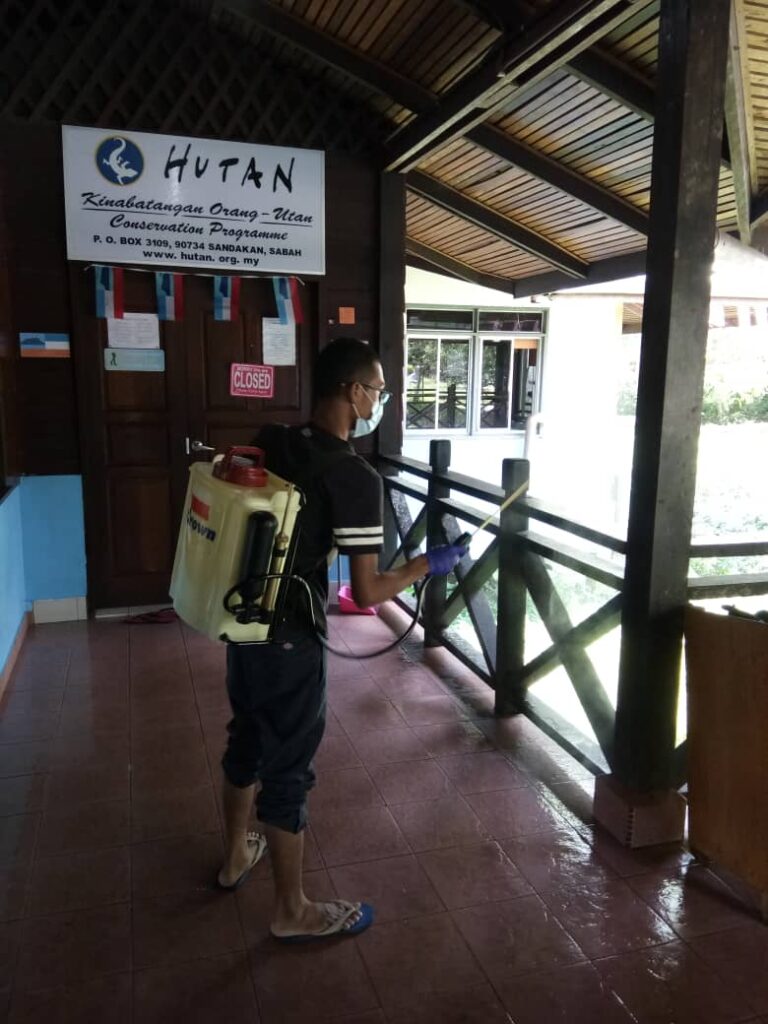
Disinfecting communal areas helps stop the spread of infection and reduces the risk to both humans and Orangutans. Image credit: HUTAN.
Loss of income for reserves
Until earlier this year the Kinabatangan River was a popular tourist destination, welcoming visitors who boarded boats every day to look for Sabah’s wonderful wildlife, with the possibility of seeing Bornean Pygmy Elephants bathing and swimming, Orangutans moving freely in the trees and flashes of brightly coloured birds like Rhinoceros Hornbill and Stork-billed Kingfisher. But now the boats remain moored and, apart from the sounds of the forest, all is quiet. With no visitors, many people’s livelihoods are on the line. Village communities who get some income from home-stay tourism to the larger lodges, all doors are closed. Ecotourism at its best provides an environmentally and economically sustainable alternative to more destructive money making ventures, such as oil palm cultivation. Ecotourism is meant to be a win-win for the landscape, wildlife, and local communities. Hutan, and the Keepers of the Wild (reserve rangers, some of whom are funded by WLT) will continue ‘business as usual’ as far as possible, protecting the forests and the wildlife in reserve areas with increased vigilance. With no tourists coming to Borneo the priority on keeping disease transmission between humans and animals in check life for local communities will remain uncertain.
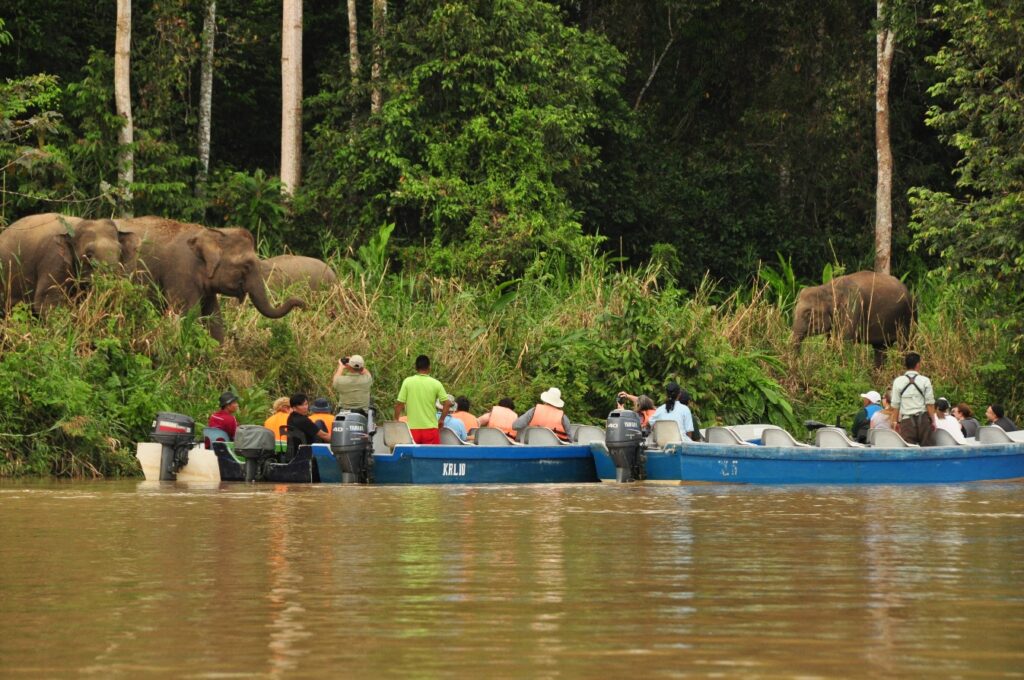
The economic benefits of wildlife tourism are considerable – providing jobs for local people and income for the management of protected areas. However, sometimes tourists get dangerously close to wildlife and during the current pandemic all tourism has ceased. Image credit: HUTAN.
Protecting Orangutans and other threatened wildlife of the Lower Kinabatangan
The Lower Kinabatangan Wildlife Sanctuary (roughly 26,000 ha) was created in 2005, a first step towards the protection of rare and endangered species. Yet the sanctuary is small and severely fragmented, driving many local wildlife populations to the edge of extinction. Human-wildlife conflicts are also an issue. Hutan works to mitigate the effects of forest fragmentation and to establish strategic wildlife passageways reconnecting the fragments of the Lower Kinabatangan Wildlife Sanctuary. There are thought to be less than 1,000 Orangutans surviving in the wild in this region so it is essential that they are protected from viruses spread by humans.
Find out more about the Keepers of the Wild
A one-off donation of £5,000 will sponsor a reserve ranger for a year, and companies and individuals who donate £5,000 receive regular field reports from the ranger.
But every donation, no matter how small, helps rangers carry out their essential duties to protect threatened habitats and species.
